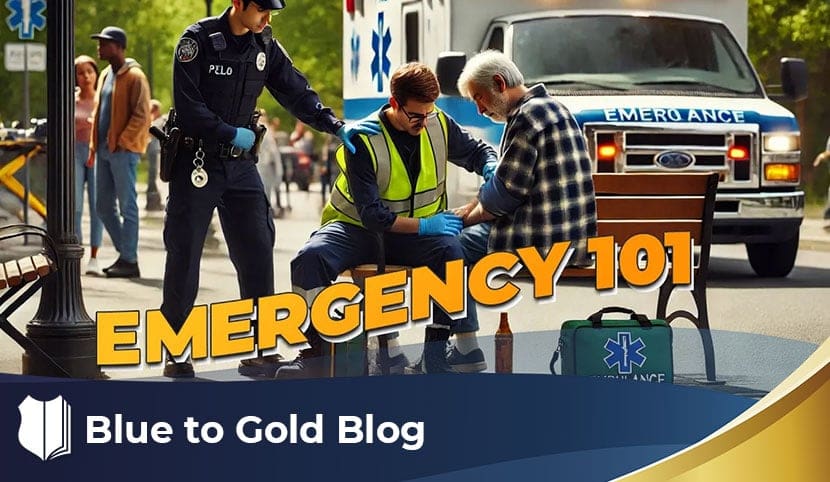This is an interesting question. An officer in Tennessee asked, “We responded to assist EMS on a medical call, and now EMS is forcing a subject to go to the hospital against their will. They’ve asked for police help to escort the subject to the ambulance, which may require force because the subject is refusing to go. Can we legally assist EMS, even though the subject is not doing anything criminally wrong and does not qualify for emergency detention?”
What an amazing question! I can only imagine being on the scene and thinking, “What am I supposed to do here?” Let me give you one quick piece of advice: If you find yourself in this situation and you’re unsure of what to do, it’s important to start thinking about keeping the scene safe. If the person is combative, for example, you want everyone to be safe. But you also need to start making some phone calls and asking your higher-ups, “What should I do here?” Let the bosses make decisions like this; that’s part of their job. When you have three stripes, bars, or stars, making decisions in situations like this is your responsibility.
Now, let’s break down the law. The first thing we can agree on is that you will need a law to enable you to act. We are not the henchmen or muscle of EMS. They have their own medical protocols, and they are allowed to involuntarily transport someone against their will, but they have their own rules and liabilities. We need to make sure we are operating within our own legal boundaries. We are not EMS; we don’t have their medical training or rules.
What law are we enforcing here? I’ll clarify—I’m not giving you legal advice, but rather legal education. I understand that this situation can be tough. So, the question is, what law allows you to intervene? It doesn’t have to be a criminal law. For example, a civil commitment law allows you to assist if someone is experiencing a mental health crisis and poses a danger to themselves or others. This doesn’t involve criminal charges but still enables you to force someone to go to the hospital.
Let me explain with Tennessee law. The relevant statute is Tennessee Code 33-6-401, which deals with emergency detention. It states that a person may be detained for examination if they have a mental illness or serious emotional disturbance and pose a substantial risk of serious harm. If they qualify under this statute, they can be detained for care and treatment. This statute is designed for civil commitments, not criminal cases.
Now, with the facts presented, we must address whether being highly intoxicated qualifies as a mental illness. I’m not aware of any cases that consider intoxication to be a mental illness. While alcoholism can be considered a mental illness, that’s not the reason a person would be hospitalized in this case. You’re not going to the hospital for being an alcoholic, and you’re not being involuntarily committed just because you’re an addict. The focus is on whether someone has a true mental illness or a serious emotional disturbance.
Tennessee law likely does not cover someone who is simply highly intoxicated. I suspect that the legislature isn’t thinking of intoxicated individuals when they wrote the statute. They’re likely thinking about serious behavioral health emergencies, like excited delirium or someone contemplating suicide or harm to others. These situations involve a serious emotional disturbance, even if the person is otherwise mentally sound.
But what if the person is simply drunk and a danger to themselves? That brings us to the next issue. Does Tennessee have a statute that allows police to detain someone who is publicly intoxicated for their own safety? Many states have such laws. For example, Nevada allows police to detain individuals who are so intoxicated they can’t care for themselves, to prevent them from being harmed. This does not involve criminal charges but is a safety measure.
The key point here is that while being intoxicated does not qualify someone for civil commitment under Tennessee’s mental health laws, there may be other statutes that allow police to detain a person for safety reasons. If Tennessee has a public intoxication statute that allows police to intervene and ensure someone’s safety, then this could be your legal basis for assisting EMS.
I agree with the officer’s observation that intoxication alone does not justify civil commitment for a mental illness. However, the question remains: Does Tennessee have a statute allowing police to detain someone temporarily for public intoxication? I didn’t find it in my research, but I’m hopeful that it exists. If you know of such a statute, please share it in the comments. I would love to know if it’s out there.
In conclusion, my advice is to proceed carefully. You should ensure that there is a law enabling you to assist EMS in this situation. If no such law exists, I would caution against intervening too aggressively. It’s much easier to sue a police officer than an EMS worker, as officers have more regulations governing their actions.
I hope this helps clarify things. This is just my contribution to the conversation. Thank you for the difficult work you do, especially in situations like this. Until next time, stay safe.










